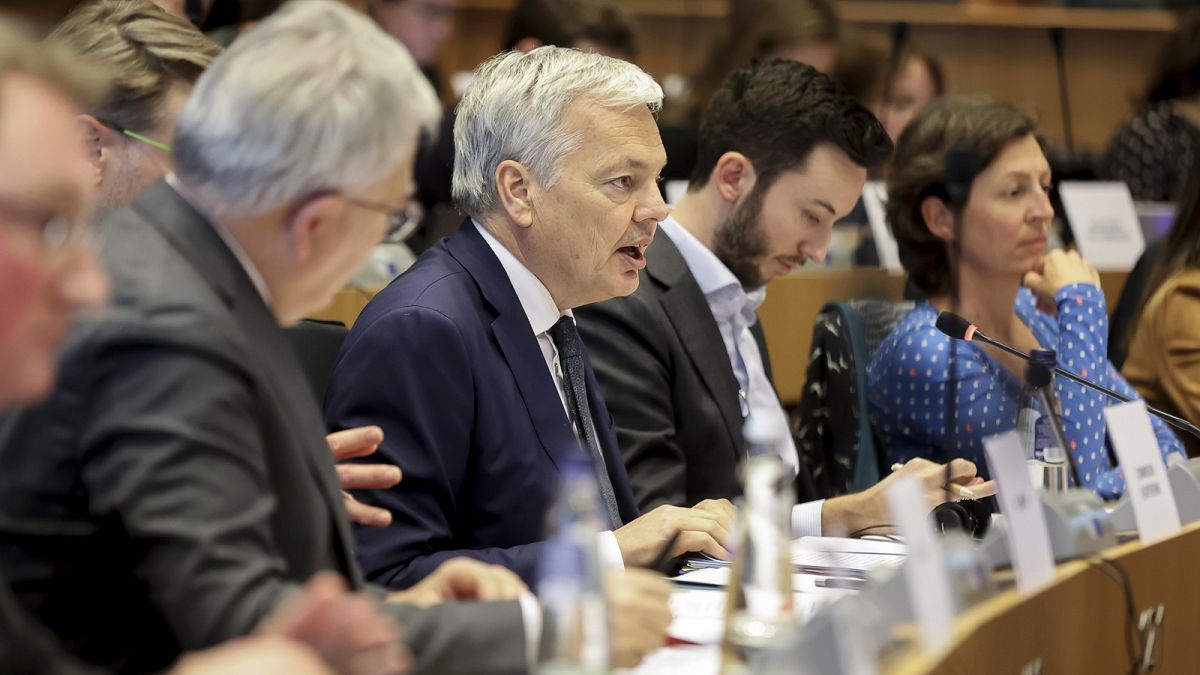Members of the European Parliament spent Wednesday afternoon grilling three Commissioners over what they described as a "background deal" with Viktor Orbán to release frozen EU funds.
Commissioners Didier Reynders (Justice), Nicolas Schmit (Jobs) and Johannes Hahn (Budget) were questioned over the decision to unblock cash for Hungary, which the European Commission had previously paralysed over persistent rule-of-law concerns.
The main point of contention was the particular timing of the mid-December decision to release €10.2 billion in reaction to the judicial reform to decrease political interference that Budapest adopted,which was taken one day before a high-stakes summit of EU leaders.
The overhaul was designed to satisfy four "super milestones" that Brussels had imposed as a condition to resume payments and ensure proper oversight over taxpayers' money.
The move infuriated the Parliament, who saw it as a capitulation to Orbán's demands, a neglect of duty and an affront to fundamental rights. The hemicycle has threatened to launch legal action against the Commission if further funds are unblocked.
Prior to the summit, Orbán had spent weeks openly saying he would veto the opening of accession negotiations with Ukraine and a €50-billion special facility to provide Kyiv with reliable financial support until 2027. The belligerent tone raised the alarm in Brussels and fuelled speculation the meeting would turn into an embarrassing fiasco for the bloc. In the end, Orbán agreed to the accession talks but derailed the €50-billion plan.
In their interventions, MEPs argued the Commission had rushed to green-light the €10.2 billion just mere hours after Hungary published the remaining piece of the judicial reform in its official journal. The extremely tight timeline, they said, made it all but impossible to properly examine the new law and its compliance with the "super milestones."
"Coincidentally, it was right before the summit," said Eider Gardiazábal, from the socialists. "Normally, coincidences are not that coincidental."
"Of course it was political," Moritz Körner, from the liberal group, argued. "Orbán had to be won over."
"In politics, everything is always as it seems to be," Finnish MEP Petri Sarvamaa said.
Katalin Cseh, a Hungarian politician whose party Momentum is in the opposition, delivered a stinging rebuke, accusing the Commission of ignoring the "warning signals" that Hungarian and international experts had sent about the shortcomings and loopholes of the judicial reform.
"The time necessary to scrutinise the law was just simply not there," Cseh said. "This was all part of a background deal. Obviously, the Commission could not properly monitor the implementation, which was also a requirement."
Facing an onslaught of criticism, the three Commissioners stuck to the line that Hungary had provided sufficient evidence to demonstrate compliance with the four "super milestones," which included measures to strengthen the National Judicial Council, a self-governing supervisory board, and crack down on political meddling inside the Supreme Court.
"The Commission was under legal obligation to take a decision," Reynders said.
Schmit noted that the December decision did not "automatically" trigger a €10.2-billion payment to Budapest but only the possibility to request reimbursements for development projects carried out on the ground. So far, only €485 million has been wired, he added.
The trio reminded the room that, as of today, the Commission is still withholding nearly €12 billion from Hungary's allocated share of cohesion funds and most of its €10.4-billion recovery and resilience plan, as Budapest has failed to meet the other milestones related to issues such as conflicts of interests, LGBTQ+ rights and academic freedom.
But according to MEPs' estimations, under the regulation that governs cohesion funds, the Commission could have waited an additional nine days to approve the release of funds. Doing so, they said, would have allowed a longer time to examine the legislation and avoid the eyebrow-raising coincidence with the summit.
Lawmakers also complained the executive fast-tracked its rubberstamp on the judicial reform without waiting to see its practical effects on the courts and magistrates.
"The big question here is: has there been an actual assessment of progress on the independence of the judiciary in Hungary? Or was there a political deal to get rid of Orbán's veto?" said Daniel Freund, from the Greens.
"You wanted this out the door before leaders met," he added.
Dimitrios Papadimoulis, from the Left, criticised the Commission for creating the impression of "succumbing" to Orbán, who has repeatedly asked for the entire pot of cash to be unfrozen, and gaining nothing in return, given the €50-billion facility for Ukraine remains stuck in negotiations, despite Kyiv's urgent need for support.
"Issues of the rule of law are far too important to be involved in such bargaining," Papadimoulis told the room.
Reynders fought back, saying all the elements of the judicial reform had been thoroughly negotiated between Brussels and Budapest, meaning the Commission knew "very well" the content of the laws before their publication in the official journal.
"Your answers seem like Teflon," Monika Hohlmeier, the conservative who chairs the parliament's budget control committee, said. "What I'm missing here is actual facts."
